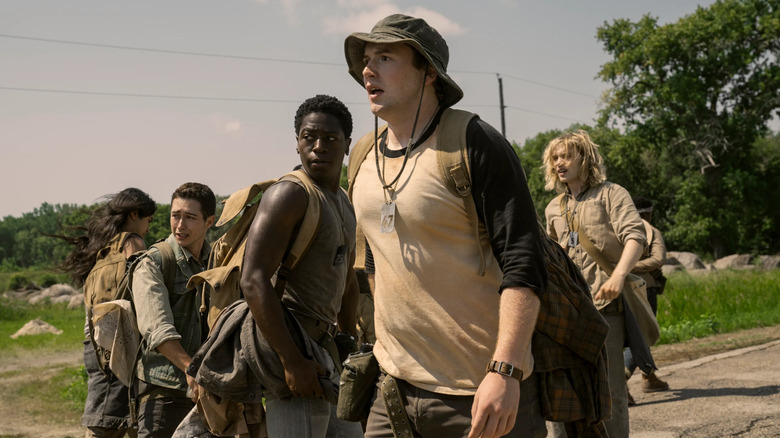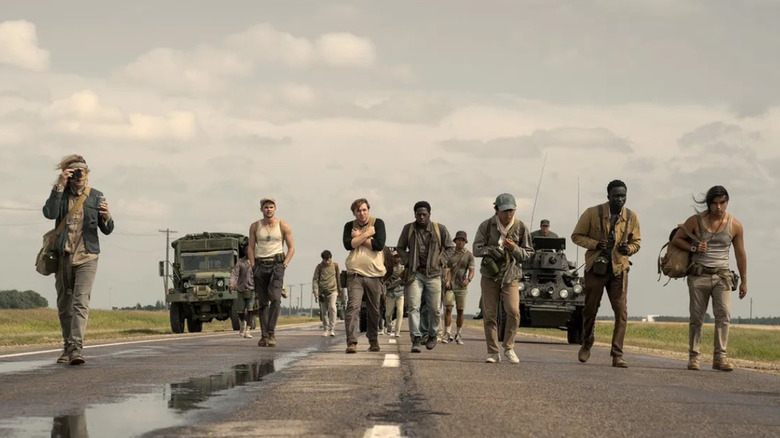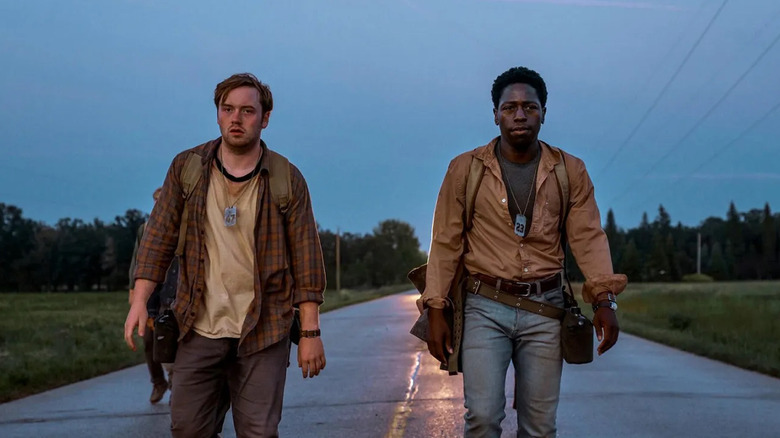How The Long Walk Movie Changes Stephen King's Book For The Better
Major spoilers for "The Long Walk" follow.
"The Long Walk" has the distinction of being the very first book Stephen King ever wrote, penned back when the best-selling author was only 19. It would take a few more years for the master or horror to get around to publishing it, though, and when he did, it was under his pseudonym, Richard Bachman. In the years since the book hit the shelves, and Bachman was outed as King, various filmmakers have struggled to bring King's ultra-bleak book to the big screen. Until now.
Francis Lawrence has managed to successful make a "Long Walk" movie, and perhaps that's appropriate, since Lawrence helmed several "Hunger Games" films and there's "Long Walk" DNA all over "The Hunger Games." Working with screenwriter JT Mollner, Lawrence has taken King's brutal, pessimistic, violent book and more or less kept it intact. There's nothing watered-down here: The constant drum of death that's present in the book is on full display in the film, and Lawrence never flinches away from showing characters meet their demise in graphic, upsetting fashion. It's genuinely surprising that such a mainstream movie is so relentlessly bleak.
Also surprising is that while "The Long Walk" movie stays fairly faithful to King's book, it also makes a few key changes — and those changes end up improving on the story. Strict faithfulness to source material isn't required when bringing a book to screen, but it's rare for a film to so uniquely improve on a book that was already good to begin with. I think King's "Long Walk" book is excellent. I think "The Long Walk" movie is even better.
The Long Walk movie stays close to the book, but makes some key changes that strengthen the story
Stephen King adaptations can be hit or miss when it comes to faithfulness. By now, everyone knows that Stanley Kubrick's "The Shining" strays considerably from King's source material, and yet, that film is fantastic (even if King disagrees). King then penned a miniseries remake that remained rigidly faithful to his book ... and the results were underwhelming to say the least.
With "The Long Walk" movie, Mollner's script keeps the majority of King's text intact. Like the book, the film is set in a dystopian alternate America where a group of boys enter a competition known as the Long Walk. They must walk for miles along a stretch of road. If they slow down or stop, they get a warning. If they get three warnings, they're shot to death by soldiers who follow along with them in tanks and trucks. The only way to win is to be the last boy standing. I'm not going to break down every single change the movie makes from the book, but it is worth noting that while the film keeps all of this, it does change on key detail right away: In the book, the contestants must walk continuously at 4 MPH. In the film, it's 3 MPH. This change in speed was suggested by King himself, who felt it was more realistic to maintain a 3 MPH pace over a sustained period of time.
Both book and film focus primarily on Ray Garraty, played in the movie by Cooper Hoffman. In the book and the film, Ray bonds with several of his fellow walkers, particularly a guy named Pete McVries, played in the film by David Jonsson. Here, Mollner's script starts to make some subtle but smart changes. While Ray bonds with the other walkers in the book, the bonding is even more pronounced in the movie. Ray spends a lot of the book lost in his own thoughts, as that tends to be how King writes his characters. But since movies force characters to externalize things more, Mollner's script wisely has Ray's friendship with the group become more essential to the narrative — which will make the impending deaths all the more heartbreaking. And while Ray and Pete become close in the book, their friendship is even stronger in the movie. In the book, there are long stretches where Ray seems to be walking alone, nowhere near Pete. However, in the film, Pete never leaves Ray's side — it's like they're joined at the hip. This is a much better concept as it makes us connect with both Ray and Pete at the same time. We know that one of them is doomed to die at any moment, but we've come to think of them as joint lead characters because they're constantly sharing the screen.
The Long Walk movie ending is very different from the book, and better
The biggest change between "Long Walk" book and film involves the ending. In the book, Ray doesn't quite understand his motivations for partaking in the walk. The film, however, gives him an ulterior motive: his beloved father (Josh Hamilton) was killed by The Major (Mark Hamill), the military dictator who runs both the Long Walk and seemingly America. Ray wants to win the Long Walk because, in addition to money, the winner is granted one wish, and Ray plans on wishing for a gun — a gun he'll use to shoot The Major. He makes Pete aware of this plan, and Pete tells him that if he wins, he should simply take the money and go back to his mother (Judy Greer) and forget about revenge.
In both the book and the film, the Long Walk eventually winds down to three surviving contestants: Ray, Pete, and a guy named Stebbins (played by Garrett Wareing in the movie). In both book and film, Stebbins reveals he's the illegitimate son of The Major. But here is where things start to diverge. Whereas the book version of Stebbins seems unstoppable, the movie Stebbins comes down with some sort of sickness. The movie never clarifies what it is, but it's likely pneumonia, because that's what happens to another character in the book named Scramm. Movie Stebbins, worn down, sick and tired, decides to give up and allows himself to be shot. In the book, however, it's actually Pete who gives up and gets shot, much to Ray's horror. In the end, only Ray and Stebbins are left, and Ray is sure that Stebbins will win. But Stebbins' body eventually gives up on him and he dies, leaving Ray as the winner.
The film is vastly different. After Stebbins dies, Pete and Ray continue on, side by side. As they stagger forward in the rain towards a waiting crowd, Pete hangs back, planning to sacrifice himself so Ray can win. But Ray notices this and immediately pulls Pete to his feet and insists they continue on together. However, once this happens, Ray then hangs back. Ray already has three warnings at this point, so he's instantly shot in the stomach and collapses. Horrified, Pete rushes to him. Dying, Ray says that he ultimately gave up because Pete has a hope inside him that Ray simply does not have, and that Ray has the strength to carry on. He's then shot in the head by The Major. In the book, Ray is the sole winner, but he's so delirious and deranged from the Long Walk experience that he just keeps walking, hallucinating that he sees a dark figure in front of him.
In the film, Pete takes it upon himself to fulfill Ray's wish. He asks for a gun, is given one, and points it at The Major. The Major tries to talk him down, but Pete pulls the trigger, killing him. All goes quiet. Pete then looks at the road ahead of him, and the film ends. This ending is much more satisfying than King's conclusion. It's more devastating to have Ray sacrifice himself after being the main character for the bulk of the film, especially since he does it to save Pete's life. We've learned that Pete has had a much harder life that Ray and we want him to survive. At the same time, there's an undeniable sense of tragedy here. When Ray told Pete of his plan to kill The Major, Pete cautioned him against it, saying to choose love over hate, insisting that nothing good comes from revenge. But ultimately, revenge is exactly what Pete ends up choosing. These changes made to King's book only strengthen the material, turning an already great book into something even more powerful — and one of the best movies of the year.
"The Long Walk" is now in theaters.


